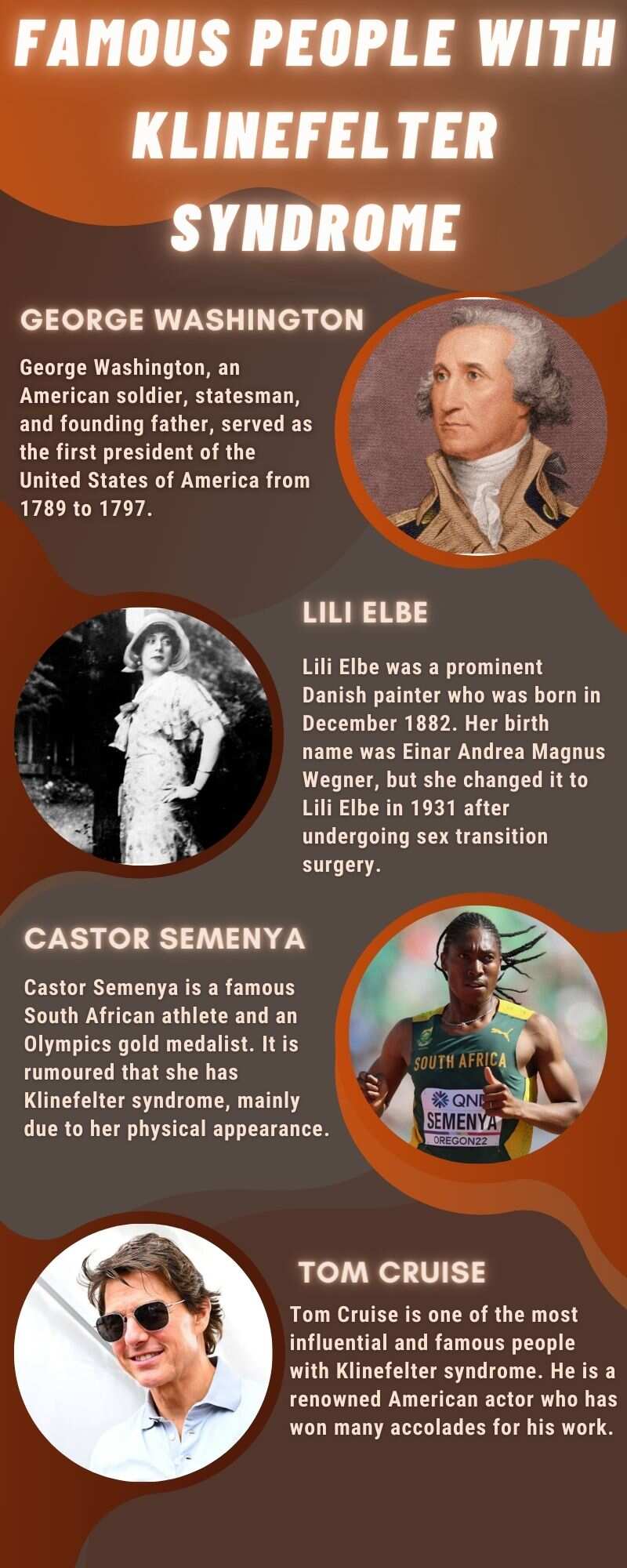Famous People With Genetic Disorders: Their Stories, Challenges, And Triumphs
When we talk about famous people with genetic disorders, we often only see their public persona, their achievements, and the glamour of fame. But behind the scenes, many of these individuals have faced battles that most of us can't even imagine. Genetic disorders are more common than you think, and some of the world's most iconic figures have lived with them, proving that greatness isn't defined by physical or genetic limitations. Today, we're diving deep into their stories, shedding light on how they overcame challenges and inspired millions around the globe.
You might be surprised to learn that some of the most celebrated names in history have dealt with genetic conditions. From artists and musicians to scientists and athletes, these individuals didn't let their disorders define them. Instead, they became role models, showing us that resilience and determination can triumph over adversity.
So, why does this matter? Understanding the lives of famous people with genetic disorders not only humanizes them but also helps us appreciate the complexity of human experience. It’s not just about their fame; it’s about the courage and strength they’ve shown in the face of challenges that many of us can barely comprehend.
Read also:Meryl Streep Shares Dressing Room With Amy Poehler A Night To Remember
Understanding Genetic Disorders
What Are Genetic Disorders?
Let’s break it down, folks. Genetic disorders are conditions caused by abnormalities in genes or chromosomes. They can range from mild to severe, affecting everything from physical appearance to cognitive function. Some disorders are inherited, while others occur spontaneously due to mutations. These conditions don’t discriminate—they can affect anyone, regardless of background or status.
Here’s the kicker: genetic disorders are more common than you might think. According to the National Human Genome Research Institute, about 1 in every 200 people is born with a genetic disorder. That’s a staggering statistic, and it underscores the importance of understanding these conditions better.
Types of Genetic Disorders
There’s no one-size-fits-all when it comes to genetic disorders. Some of the most well-known types include:
- Cystic Fibrosis: A condition that affects the respiratory and digestive systems.
- Huntington’s Disease: A progressive brain disorder that affects movement and cognitive function.
- Sickle Cell Anemia: A blood disorder that causes red blood cells to become misshapen.
- Tay-Sachs Disease: A rare condition that affects the nervous system, often leading to early death.
Each of these disorders presents unique challenges, and those who live with them often require specialized care and support. But what’s truly remarkable is how some individuals have managed to achieve greatness despite these obstacles.
Biographies of Famous People With Genetic Disorders
Albert Einstein: The Genius With Possible Neurological Challenges
When we think of Albert Einstein, we picture a brilliant mind that revolutionized physics. But did you know that some researchers believe Einstein may have had a genetic condition like Asperger’s Syndrome? While there’s no definitive proof, his unique way of thinking and social quirks suggest he might have been on the spectrum.
Here’s a quick rundown of Einstein’s life:
Read also:Dolly Partons Iconic Style A Journey Through Her Glamorous Outfits
| Full Name | Albert Einstein |
|---|---|
| Date of Birth | March 14, 1879 |
| Place of Birth | Ulm, Germany |
| Known For | Theory of Relativity |
| Possible Genetic Disorder | Asperger’s Syndrome (suspected) |
Einstein’s story reminds us that genius and neurodiversity can go hand in hand. His contributions to science continue to inspire generations, proving that labels don’t define a person’s potential.
Artists and Musicians With Genetic Disorders
Stevie Wonder: A Musical Legend With Visual Impairment
Stevie Wonder is a name synonymous with soulful music and timeless hits. But what many people don’t know is that Wonder was born prematurely, leading to a condition called retinopathy of prematurity, which caused him to lose his sight. Despite this, he became one of the most successful musicians in history.
Here are some key facts about Stevie Wonder:
- He signed with Motown Records at the age of 11.
- His albums like "Innervisions" and "Songs in the Key of Life" are considered masterpieces.
- He has won 25 Grammy Awards, making him one of the most decorated artists ever.
Wonder’s music is a testament to the power of creativity and perseverance. His blindness didn’t hold him back; instead, it fueled his unique perspective and artistry.
Scientists and Innovators With Genetic Disorders
Stephen Hawking: The Physicist Who Defied ALS
Stephen Hawking’s name is synonymous with groundbreaking discoveries in theoretical physics. But his journey wasn’t easy. At the age of 21, Hawking was diagnosed with amyotrophic lateral sclerosis (ALS), a progressive neurodegenerative disease. Doctors gave him just a few years to live, but he defied the odds, living for over 50 years after his diagnosis.
Hawking’s contributions to science are unmatched:
- He wrote the best-selling book "A Brief History of Time," which demystified complex scientific concepts for the general public.
- His work on black holes and the origins of the universe has left a lasting impact on the scientific community.
- He became a symbol of resilience, showing the world that physical limitations don’t have to limit intellectual achievements.
Hawking’s story is a powerful reminder that the mind can transcend physical boundaries.
Athletes With Genetic Disorders
Jessica Cox: The Pilot Who Flies Without Arms
Jessica Cox is a name you might not have heard before, but her story is nothing short of extraordinary. Born without arms due to a rare congenital condition, Cox didn’t let her disability stop her from pursuing her dreams. She became the first licensed armless pilot in the world, proving that determination knows no bounds.
Here’s how Cox achieved the impossible:
- She learned to fly using her feet, mastering complex maneuvers that most pilots struggle with.
- She’s also a motivational speaker, inspiring millions with her message of resilience and adaptability.
- Her achievements have earned her recognition from organizations around the globe.
Cox’s story shows us that limitations are often just in our minds. With the right mindset and support, anything is possible.
The Role of Genetic Disorders in Shaping History
How Genetic Disorders Have Influenced Society
Throughout history, genetic disorders have played a significant role in shaping the course of human events. From the way we approach healthcare to the advancements in genetics, these conditions have pushed us to innovate and adapt. They’ve also taught us the importance of empathy and understanding.
Consider this: many of the world’s greatest minds have lived with genetic disorders, and their contributions have changed the world. Without them, we might not have the technology, art, or science that we take for granted today.
Living With a Genetic Disorder: Challenges and Triumphs
Overcoming Stigma and Misunderstanding
One of the biggest challenges faced by individuals with genetic disorders is societal stigma. Misunderstandings about these conditions can lead to discrimination and exclusion. But as we’ve seen from the stories of famous people with genetic disorders, education and awareness can go a long way in breaking down barriers.
Here are some ways to combat stigma:
- Encourage open conversations about genetic disorders.
- Support research and advocacy efforts aimed at improving understanding and treatment.
- Celebrate the achievements of individuals with genetic disorders, highlighting their contributions to society.
By fostering a culture of acceptance and inclusivity, we can create a world where everyone has the opportunity to thrive.
The Future of Genetic Disorders
Advancements in Genetic Research
Thanks to advancements in genetic research, we’re now able to diagnose and treat genetic disorders more effectively than ever before. Technologies like CRISPR are paving the way for groundbreaking treatments that could one day eliminate these conditions altogether.
But there’s still a long way to go. Scientists are working tirelessly to unravel the complexities of the human genome, hoping to unlock new treatments and therapies that could change lives. It’s an exciting time for genetic research, and the possibilities are endless.
Conclusion: Celebrating Resilience and Strength
As we’ve explored the lives of famous people with genetic disorders, one thing becomes abundantly clear: greatness knows no boundaries. Whether it’s Albert Einstein’s groundbreaking theories or Stevie Wonder’s soulful music, these individuals have shown us that challenges can be overcome with resilience and determination.
So, what can we take away from their stories? First, we should celebrate the achievements of those who have faced adversity and triumphed. Second, we should work to create a more inclusive and understanding society, where everyone has the opportunity to reach their full potential.
Now, it’s your turn. Share your thoughts in the comments below, or spread the word by sharing this article with friends and family. Together, we can continue to break down barriers and inspire future generations to dream big, no matter the obstacles they face.
Table of Contents
- Understanding Genetic Disorders
- Biographies of Famous People With Genetic Disorders
- Artists and Musicians With Genetic Disorders
- Scientists and Innovators With Genetic Disorders
- Athletes With Genetic Disorders
- The Role of Genetic Disorders in Shaping History
- Living With a Genetic Disorder: Challenges and Triumphs
- The Future of Genetic Disorders
- Conclusion: Celebrating Resilience and Strength
Article Recommendations


